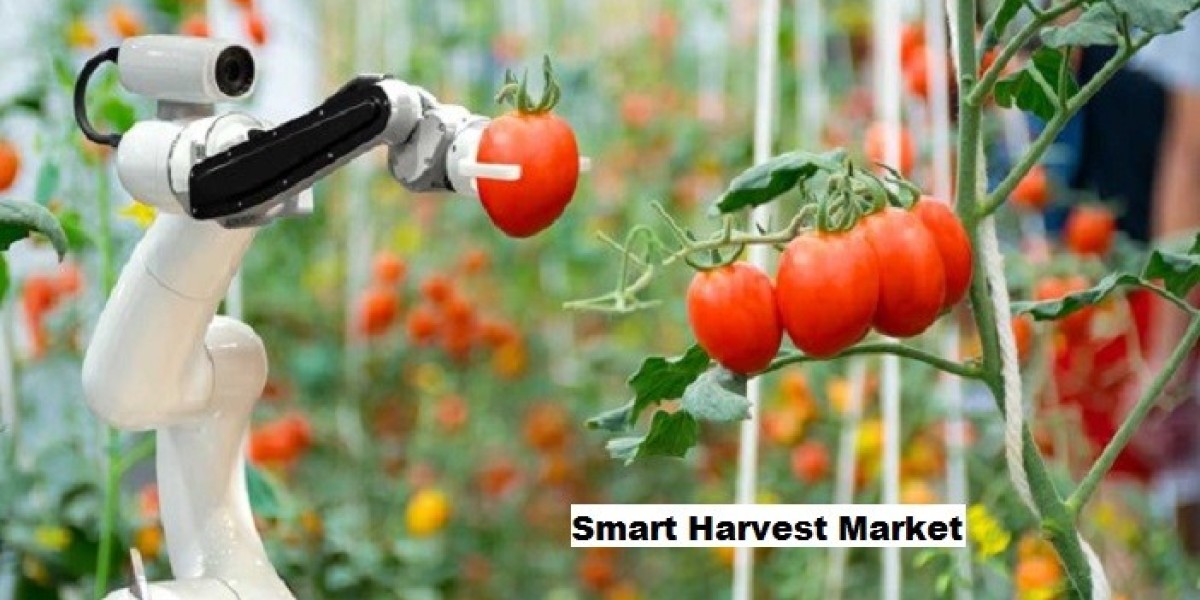According to TechSci Research report, “Smart Harvest Market – Global Industry Size, Share, Trends, Competition Forecast & Opportunities, 2028”, the Global Smart Harvest Market stood at USD 14.78 Billion in 2022 and is anticipated to grow with a CAGR of 8.55% in the forecast period, 2024-2028. The global Smart Harvest Market is primarily driven by several key factors. There is the increasing adoption of automation and control devices due to labor shortages and the need for efficient farming operations. The growing preference for healthy and fresh food products by consumers is pushing the demand for smart harvesting techniques that ensure the nutritional quality of harvests.
Additionally, technological advancements in the field of agriculture, such as Internet of Things (IoT), Artificial Intelligence (AI), and machine learning, have led to the development of innovative harvesting solutions. Moreover, government initiatives to modernize the agriculture sector and promote the use of sustainable farming practices have further propelled the growth of the market. The increasing need for food security due to the rising global population is a significant driver for the adoption of smart harvest technologies.
The scope of the Global Smart Harvest Market extends across various sectors in agriculture, integrating advanced technologies like Artificial Intelligence (AI), Internet of Things (IoT), and robotics. These cutting-edge technologies are revolutionizing the way crops are harvested and processed, bringing forth a new era of efficiency and productivity in the agricultural industry. With AI-powered systems, farmers can optimize harvesting schedules based on crop maturity, weather conditions, and market demand, ensuring that the right crops are harvested at the right time. This not only maximizes yield but also minimizes waste, contributing to sustainable farming practices. Furthermore, IoT sensors enable real-time monitoring of crop health, detecting diseases or nutrient deficiencies early on. By identifying and addressing these issues promptly, farmers can prevent crop damage and improve overall yield and quality.
Robotic automation plays a vital role in streamlining the sorting, packing, and transportation processes. With robotic systems, tasks that were once labor-intensive and time-consuming are now performed with precision and efficiency. This not only reduces the need for manual labor but also increases operational speed and accuracy, ultimately reducing costs and ensuring the timely delivery of produce to market. The market for smart harvesting technologies encompasses various regions worldwide, including both developed countries like the United States and developing regions like Asia-Pacific. In the United States, the adoption of smart harvesting technologies has gained traction due to labor shortages in the agriculture industry and the increasing demand for high-quality produce. By leveraging advanced technologies, farmers in the United States can overcome labor limitations and meet the rising demand while maintaining product quality and freshness.
In Asia-Pacific, where small-scale farming is prevalent, smart harvesting solutions offer an opportunity to improve productivity and ensure food security. These technologies provide small-scale farmers with access to advanced tools and techniques that can enhance their efficiency and yield. By harnessing the power of AI, IoT, and robotics, farmers in the Asia-Pacific region can achieve higher crop yields, optimize resource utilization, and contribute to sustainable farming practices. The global smart harvest market is driven by various factors, including labor shortages, rising demand for quality produce, and the need for sustainable farming practices. As the global population continues to grow, the demand for food is expected to increase significantly. Smart harvesting technologies provide a promising pathway to meet this demand while minimizing environmental impact and promoting sustainable agriculture. By optimizing resource utilization, reducing waste, and embracing innovative technologies, farmers can play a crucial role in preserving the planet for future generations.
Browse over XX market data Figures spread through XX Pages and an in-depth TOC on "Global Smart Harvest Market.”
https://www.techsciresearch.com/report/smart-harvest-market/7750.html
The Global Smart Harvest Market is segmented into component, site of operation, crop type, regional distribution, and company.
Based on site of operation, the On-Field segment is currently leading the Global Smart Harvest Market primarily due to the increasing adoption of automated harvesting robots and systems. These technologically advanced tools offer significant advantages including improved efficiency, reduced labor costs, and the capability to work under diverse environmental conditions. Moreover, they are designed to perform tasks such as picking, pruning, and weeding, which are typically labor-intensive and time-consuming. By integrating smart harvest technologies on the field, farmers can maximize yield and enhance productivity, thereby propelling the growth of this market segment.
These automated harvesting robots and systems are equipped with state-of-the-art sensors and artificial intelligence algorithms that enable them to identify ripe produce with precision and delicately harvest them without causing any damage. The robots can navigate through the fields autonomously, avoiding obstacles and adjusting their movements according to the changing terrain conditions. This not only saves valuable time for farmers but also reduces the risk of crop loss due to mishandling during the harvesting process.
The On-Field segment's leadership in the Global Smart Harvest Market is driven by the adoption of automated harvesting robots and systems that provide improved efficiency, reduced labor costs, and the capability to work under diverse environmental conditions. By integrating smart harvest technologies, farmers can maximize yield, enhance productivity, and promote sustainable farming practices, thereby propelling the growth of this market segment.
Based on region, Europe has witnessed a remarkable surge in the adoption of smart harvesting technology, driven by a multitude of factors. One of the primary catalysts behind this trend is the region's unwavering commitment to sustainable farming practices, which has propelled farmers to explore innovative solutions to maximize productivity while minimizing environmental impact. Moreover, Europe's strong inclination towards technology adoption in agriculture has further fueled the uptake of smart harvesting techniques.
European farmers, increasingly cognizant of the advantages bestowed by smart technologies, have embraced these cutting-edge tools to optimize their operations. By leveraging smart harvesting technology, farmers have witnessed a host of benefits, including substantial improvements in crop yield, effective reduction of waste, and judicious utilization of resources. These advancements not only elevate the overall efficiency of farming practices but also contribute to the long-term viability and sustainability of the agriculture sector in Europe.
Furthermore, the robust support from European Union policies has played a pivotal role in fostering the integration of innovative farming techniques. Recognizing the significance of food security, climate change mitigation, and the preservation of the European agriculture sector's competitiveness, the European Union has championed policies that encourage the adoption of smart technologies in farming. This proactive approach not only ensures a more secure and sustainable food supply but also positions European farmers at the forefront of agricultural innovation, empowering them to tackle the challenges posed by an evolving global landscape.
Major companies operating in Global Smart Harvest Market are:
- Robert Bosch GmbH
- Deere & Company
- Smart Harvest Ltd.
- Dogtooth Technologies Limited
- Harvest Automation, Inc.
- Root AI, Inc.
- Iron Ox, Inc.
- FFRobotics Ltd.
- Vision Robotics Corp.
- Harvest CROO, LLC
Download Free Sample Report
https://www.techsciresearch.com/sample-report.aspx?cid=7750
Customers can also request for 10% free customization on this report.
“The future of the Global Smart Harvest Market is set to be bright and robust, largely propelled by technological advancements and the increasing demand for precision agriculture. With the continual growth of the global population, the call for efficient farming technologies is forecasted to escalate, fostering the expansion of the Smart Harvest Market. Technological innovations, including AI-driven harvesting robots, crop sensors, and state-of-the-art climate prediction models are set to be key influencers, boosting productivity and minimizing waste.
The overall market perspective remains optimistic, unlocking abundant opportunities for sector players. With the integration of technology and farming, the Smart Harvest Market is poised to redefine the agriculture industry, promising a future of sustainability and efficiency.,” said Mr. Karan Chechi, Research Director with TechSci Research, a research-based management consulting firm.
“Smart Harvest Market - Global Industry Size, Share, Trends, Opportunity, and Forecast, 2018-2028 Segmented By Component (Hardware {Automation & Control Systems, Sensors, Imaging Systems, Harvesting Robots} and Software) By Site of Operation (On-Field, Greenhouse, Indoor) By Crop Type (Fruits and Vegetables), By Region and Competition”, has evaluated the future growth potential of Global Smart Harvest Market and provides statistics & information on market size, structure and future market growth. The report intends to provide cutting-edge market intelligence and help decision makers take sound investment decisions. Besides, the report also identifies and analyzes the emerging trends along with essential drivers, challenges, and opportunities in Global Smart Harvest Market.
Contact
Mr. Ken Mathews
Techsci Research LLC
420 Lexington Avenue, Suite 300,
New York, United States- 10170
Tel: +1-332-258-6602
Email: sales@techsciresearch.com
Website: www.techsciresearch.com









